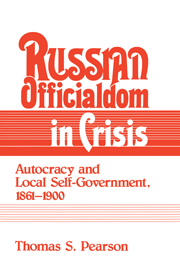Book contents
- Frontmatter
- Contents
- Preface
- Acknowledgments
- 1 Introduction: old problems, new principles – tsarist government and the Great Reforms
- 2 The birth of a new rural order: the state and local self-government, 1861–75
- 3 The breakdown of tsarist administrative order, 1875–81
- 4 The debate revived: state, social change, and ideologies of local self-government reform, 1881–5
- 5 State control over local initiative: the Land Captain Statute of 1889
- 6 The politics of the zemstvo counterreform, 1888–90
- 7 Conclusion
- Select bibliography
- Index
1 - Introduction: old problems, new principles – tsarist government and the Great Reforms
Published online by Cambridge University Press: 08 October 2009
- Frontmatter
- Contents
- Preface
- Acknowledgments
- 1 Introduction: old problems, new principles – tsarist government and the Great Reforms
- 2 The birth of a new rural order: the state and local self-government, 1861–75
- 3 The breakdown of tsarist administrative order, 1875–81
- 4 The debate revived: state, social change, and ideologies of local self-government reform, 1881–5
- 5 State control over local initiative: the Land Captain Statute of 1889
- 6 The politics of the zemstvo counterreform, 1888–90
- 7 Conclusion
- Select bibliography
- Index
Summary
The Crimean War of 1853–6 is invariably regarded as a turning point in modern Russian history and with good reason. Not only did it end the reign of Nicholas I (1825–55) and shatter the ideal of enlightened autocratic rule that he inherited from his predecessors. Even more, it triggered unprecedented levels of peasant unrest in the provinces and left the state bankrupt. Under such circumstances, as so often in the past, the Russian state embarked on a series of reforms that in the 1860s created a new administrative order in rural Russia and solidified a ministerial system of government that remained fatefully intertwined down to 1917. Yet by almost all accounts changes in provincial administration were urgently needed. So ubiquitous was the corruption and inefficiency of rural officials that the description of it in the works of Gogol, Saltykov-Shchedrin, and other contemporary writers amused but did not shock their readers. As for officials themselves, Petr Aleksandrovich Valuev, the governor of Courland Province and later minister of internal affairs (1861–8) was not alone in pointing out that suspicion, ignorance, and incompetence were the most distinguishing shortcomings of Russian bureaucrats, and that provincial administration stood in need of complete overhaul.
The shortcomings of provincial administration noted by Valuev were not new to Russian officials. They had long wrestled with the problem of how to make local government efficient and had faced the dilemma of whether to administer local affairs directly from St. Petersburg, an approach consistent with the extension of ministerial power in nineteenth-century Russia, or to turn such matters over to officials elected by the local population.
- Type
- Chapter
- Information
- Russian Officialdom in CrisisAutocracy and Local Self-Government, 1861–1900, pp. 1 - 20Publisher: Cambridge University PressPrint publication year: 1989



